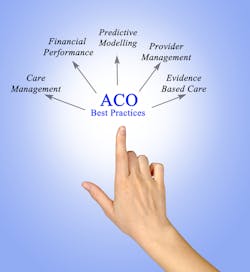Health systems and value-based care-focused companies are forming new partnerships to participate in CMS’ ACO REACH model. These groups are starting to provide details about their approaches to meeting the model’s care coordination and health equity targets.
ACO REACH is an advanced alternate payment model (APM) for physicians in value-based arrangements that requires assuming financial risk for Medicare beneficiaries while committing to advancing health equity, stakeholder feedback and participant experience. To better support care delivery and coordination for patients in underserved communities, each model participant must design and implement a comprehensive health equity plan that identifies its underserved communities and establishes initiatives to measurably reduce health disparities within their beneficiary populations.
The Center for Medicare and Medicaid Innovation has named the 110 participants provisionally accepted to participate in the ACO REACH model starting next year. CMMI accepted fewer than 50 percent of applicants, and 18 organizations withdrew their applications after receiving provisional acceptance.
The Medical University of South Carolina (MUSC Health) and value-based healthcare company UpStream Healthcare have announced their partnership that they say will create opportunities for providers to improve key metrics and improve clinical outcomes for patients, while strengthening the coordination of primary and specialty care within the network. More than 300 primary care physicians caring for more than 30,000 seniors are expected to participate.
A goal of the program is to advance health equity for the underserved with a focus on preventive care and managing chronic conditions. The UpStream platform recognizes that primary care physicians have the ability to serve as quarterbacks for their healthcare system. Pharmacist-led teams are embedded into primary care providers' practices along with nurse coordinators who perform home visits to coordinate care and ensure patients' needs are met. UpStream provides the technology to support the workflows of this care coordination model.
"UpStream will enhance our physicians' capabilities to provide better care for our patients, especially for vulnerable seniors in underserved communities who will benefit from this level of coordination," said Patrick J. Cawley, M.D., MUSC Health CEO, in a statement. "And, importantly, our collective success is closely tied to producing good patient outcomes and reducing avoidable hospital readmissions, which is a win-win for patients, providers and health systems."
A focus on FQHCs
NeueHealth Partners Community ACO, a partnership between NeueHealth and the nonprofit Medical Home Network, will begin participating in the ACO REACH model starting Jan. 1, 2023. The NeueHealth Partners Community ACO expands on two NeueHealth Direct Contracting Entities (DCEs) that served approximately 47,000 Medicare beneficiaries as of the second quarter of 2022.
NeueHealth, the care delivery and provider enablement business of Bright Health Group, formed the ACO in partnership with Medical Home Network (MHN) to support Federally Qualified Health Centers (FQHCs) transition to value-based care. MHN will serve as the new ACO's care enablement partner and brings its practice-based care management model and technology solutions.
The NeueHealth Partners Community ACO is partnering with 20 FQHCs in Missouri, Ohio, Michigan, and Indiana serving almost 20,000 Medicare beneficiaries.
"NeueHealth is eager to continue our work helping providers transition from volume to value and reduce health inequities for beneficiaries," said Megan North, president of NeueHealth Solutions, in a statement.
"MHN is thrilled to partner with NeueHealth in the new ACO REACH model, which we were pleased to see encourages participation from safety net providers and has many elements that relate to health equity," said Melanie Tan, vice president for strategy and growth at MHN, in a statement "Leveraging MHN's proven care model, it's a great opportunity for FQHCs to enhance their care management capabilities."
An ACO for the high-needs population
New York-based Calvary Hospital, a care provider for people and families living with complex and end-stage illness, has established a High Needs Population Accountable Care Organization (HNP-ACO) that is part of the ACO REACH model.
NavigatorACO will coordinate, communicate, and care for the changing needs of at-home patients who have complex care needs, playing a complementary role within their continuum of care in the Greater New York area. NavigatorACO will serve communities in the Bronx, Manhattan, Brooklyn, Queens, Nassau, Westchester, and Rockland counties as well as Connecticut's Middlesex, New London, and New Haven counties.
"NavigatorACO provides unmatched care and oversight in patient homes, offering the extra layer of support that community practitioners need for their medically complex patients," said Dr. Christopher Comfort, M.D., president of NavigatorACO, in a statement. "Working with other healthcare professionals and organizations, we simplify the complex clinical, administrative, and logistical issues associated with high-needs patients.
NavigatorACO was started to form sustainable relationships with referring medical practices, hospitals, and health service organizations to deliver better health outcomes, higher patient satisfaction, and lower costs. High-needs patients, who can account for up to 20 percent of any group's Medicare volume, consume a disproportionate amount of time and resources. NavigatorACO is exclusively focused on these patients' needs.
"We also play a focused role for post-acute discharges in mitigating re-admissions,” Comfort added. “NavigatorACO has access to unique Medicare Benefit Enhancements that are not otherwise available to beneficiaries."
New analytics tools
In addition, healthcare analytics vendors are introducing new capabilities to meet ACO REACH requirements. For instance, Nashville-based Ursa Health has created a new module for its Ursa Studio that generates program performance measures and uncovers their underlying drivers to better understand opportunities for improvement.
“As CMS works to help shift the healthcare delivery system toward provider-defined initiatives, it’s encouraging to see that the lessons learned along the way are incorporated into new payment models,” said Robin Clarke, M.D., Ursa Health’s CEO, in a statement. “The challenge facing innovators participating in these models, however, is that traditional analytics tools can’t keep up with the pace of change. Ursa Studio’s combination of no-code technology and prebuilt content ensures that organizations can not only adapt quickly to meet these and other emerging requirements but also fully customize their analytics to their particular patient populations, healthcare ecosystem, and clinical model.”


